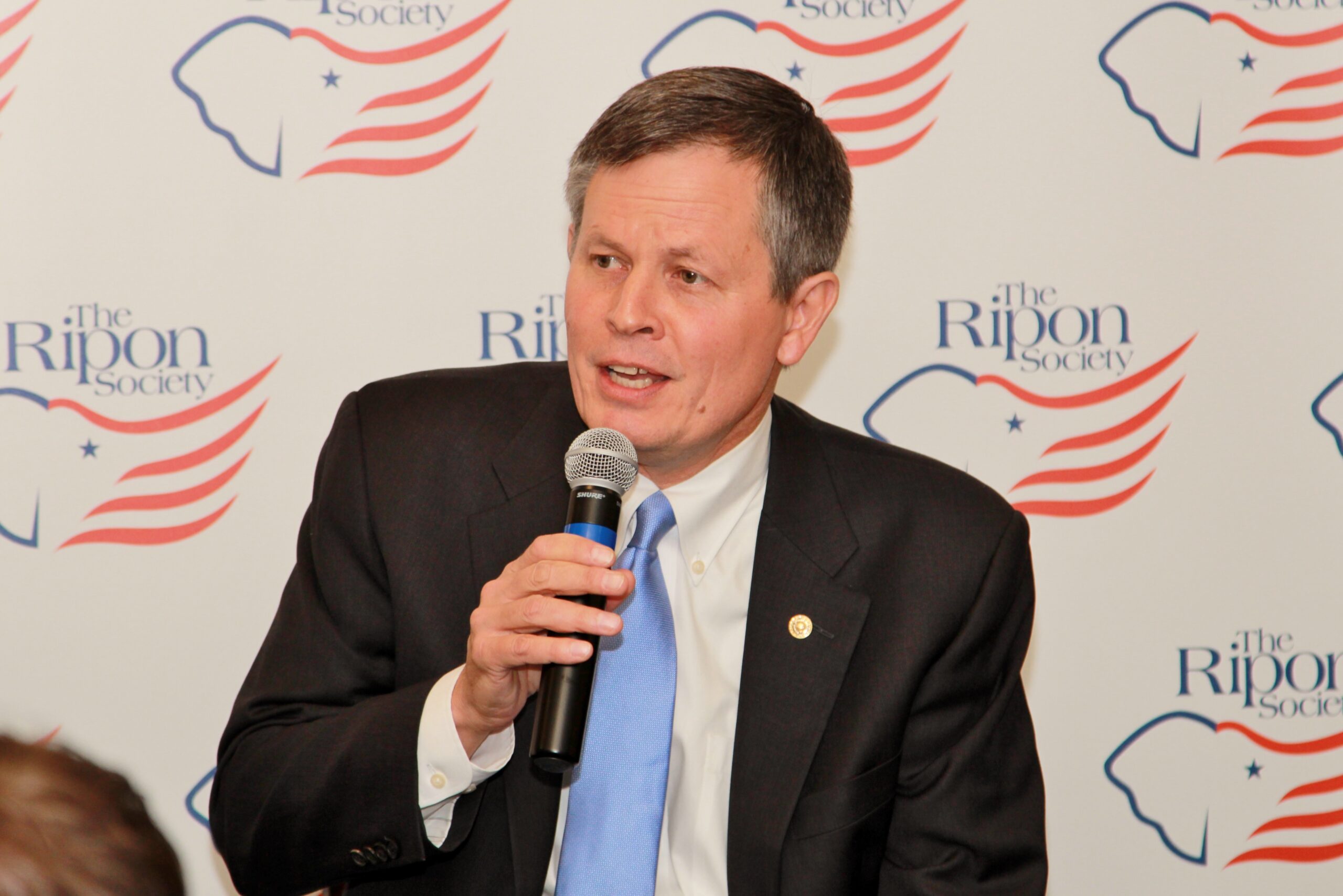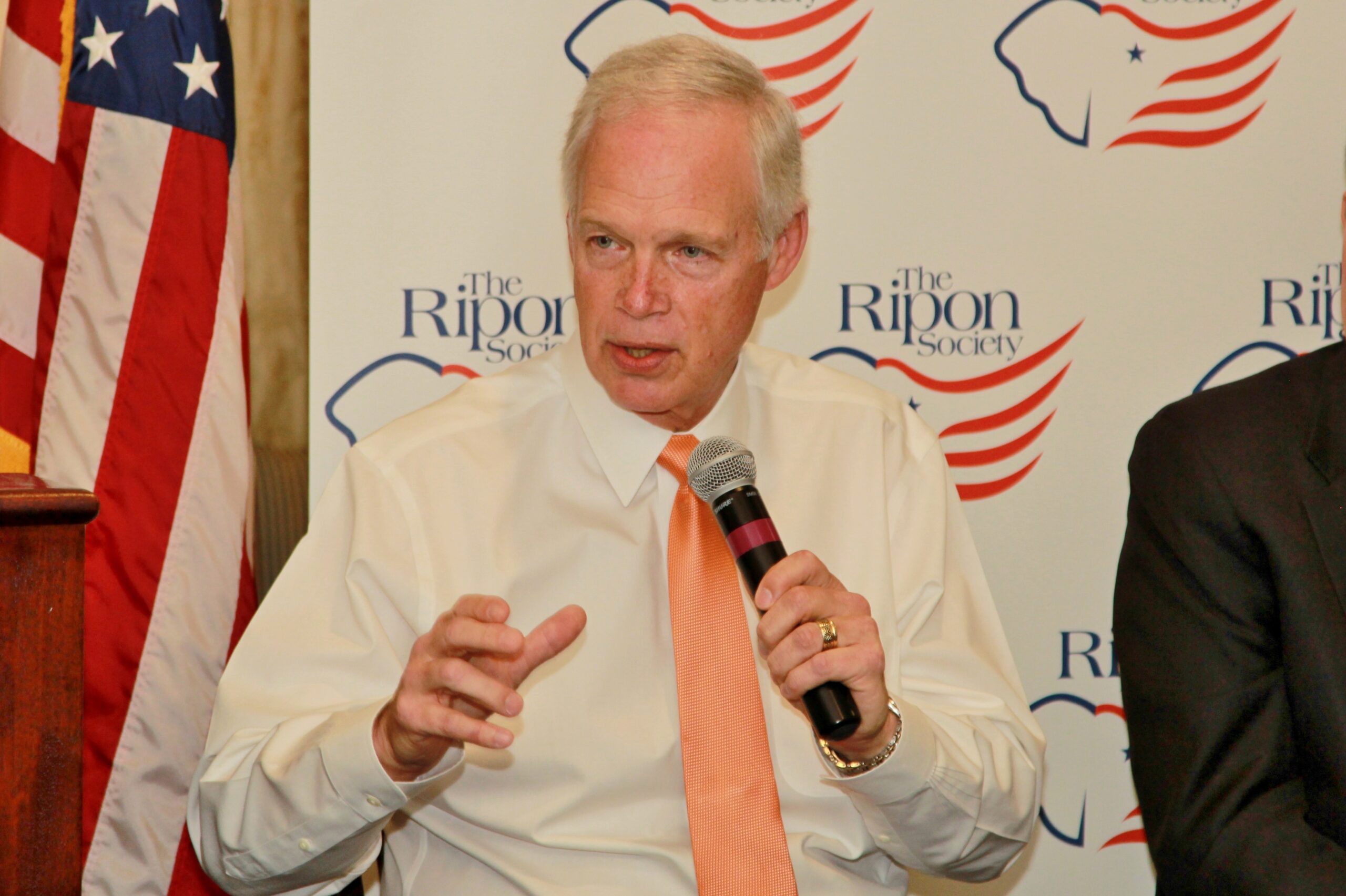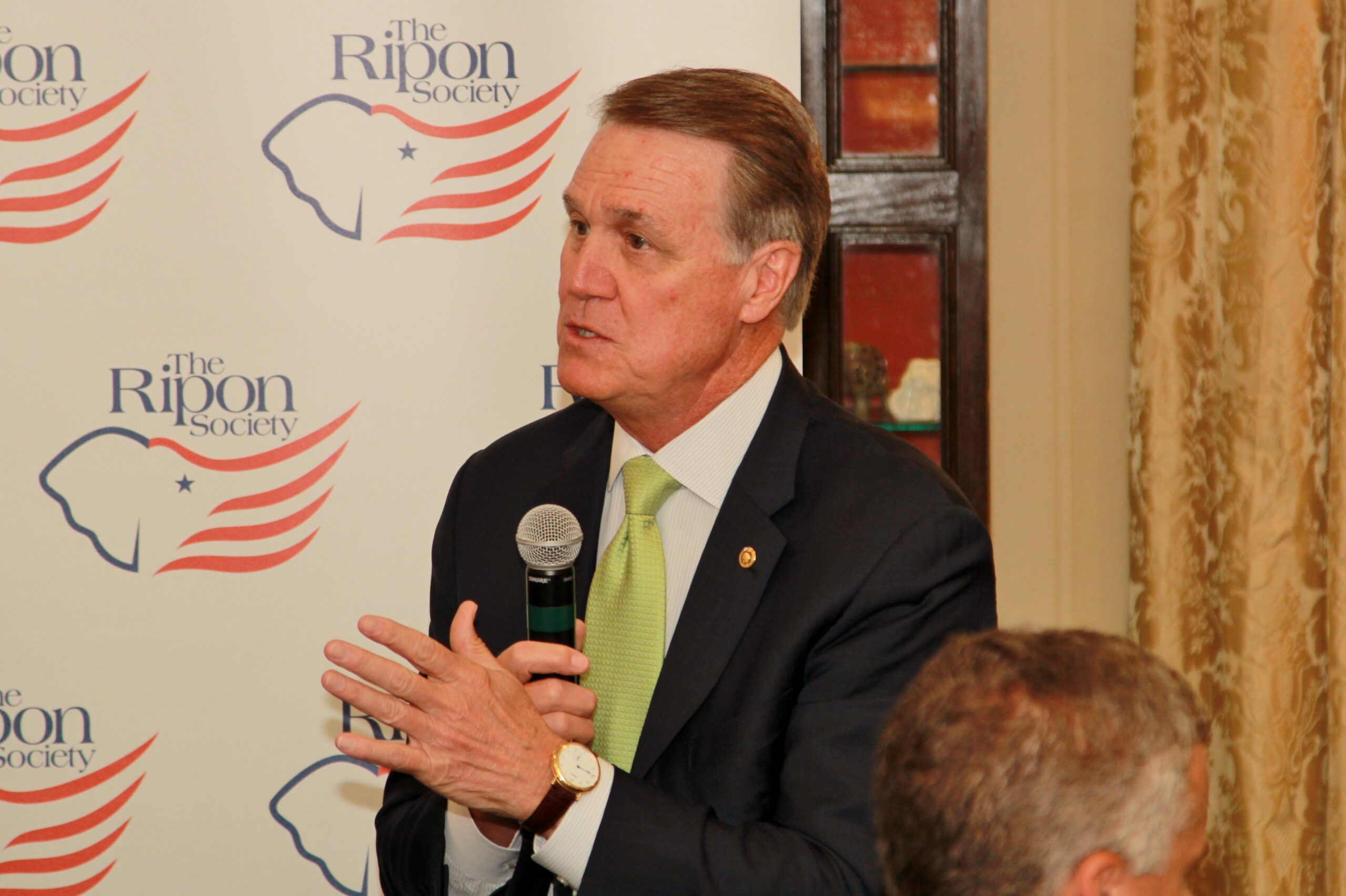 Daines, Johnson & Perdue Discuss Recent Trip to China & the Current State of Sino-American Relations
Daines, Johnson & Perdue Discuss Recent Trip to China & the Current State of Sino-American Relations
WASHINGTON, DC – With China growing in power and its relationship with the U.S. being put to the test, The Ripon Society held a breakfast discussion yesterday morning to examine the state of Sino-American relations, and the trade war between the two countries that has erupted this year.
Leading the discussion were three Senators who traveled to China as part of a congressional delegation this past March. The Senators included Steve Daines (MT), Ron Johnson (WI), and David Perdue (GA). Daines led the delegation, and kicked off the discussion by talking about the U.S. relationship with China and what the group saw while they were there.
“I think this is the most important relationship that we have,” the Montana lawmaker stated. “Think about where we are going as a world and where China is headed … The top five banks in the world today are in China. Three of the top six Internet companies in the world are in China. We’ve got Amazon and Google. They’ve got Tencent, Alibaba, JD.com.
“I asked that this delegation visit the technology ecosystem that is developing in China, and that’s what we focused our time on. I was thrilled to have David Perdue and Ron Johnson come along. I think we all came away changed. You have one more picture of what’s going on in China.”
 Daines spent almost 30 years as a businessman before his election to the U.S. House of Representatives in 2012. For five and half of those years, he lived and worked in China as an executive with Procter & Gamble.
Daines spent almost 30 years as a businessman before his election to the U.S. House of Representatives in 2012. For five and half of those years, he lived and worked in China as an executive with Procter & Gamble.
He has traveled to the country and region numerous times since, including most recently this past May, when he saw further indication of China’s future growth.
“I took another trip back to Shanghai recently,” he recalled. “I met with John Bruns, the President and CEO of Boeing. He said the top three airlines right now measured by fleet are American, Delta, and United. By 2035, it’ll be China Southern and Air China. They’ll displace U.S. airlines and the larger airlines around the world. So this is where it’s all headed.”
Johnson agreed.
“Let’s face it,” he said, “the economy is made up of two things — human capital and financial capital. China has 1.4 billion people. They have the financial capital now. They have the innovation. They’ve stolen our secrets, and they’re innovating themselves. So from my standpoint, what we need to start doing is, first of all, somewhat turn the tables.
“Because of their intellectual property theft and because of their mercantilist way of doing business, they’ve been winning and the rest of the trading world has been losing. And President Trump is absolutely right to walk that line. But I don’t believe we’re going to have the capability of turning the tables where it’s a win-lose situation — where we win and they lose.”
 Like Daines, Johnson is also a veteran of the private sector, having spent over three decades running a successful manufacturing company in Wisconsin prior to his election to the Senate in 2010. He noted that the company has been exporting to China for over 20 years. In part as a result of that experience, he understands not only the significance of the Chinese market, but why it’s important for America and its allies to stick together — not only to make sure the Chinese play by the rules economically, but to make sure they play a productive role with regard to global security.
Like Daines, Johnson is also a veteran of the private sector, having spent over three decades running a successful manufacturing company in Wisconsin prior to his election to the Senate in 2010. He noted that the company has been exporting to China for over 20 years. In part as a result of that experience, he understands not only the significance of the Chinese market, but why it’s important for America and its allies to stick together — not only to make sure the Chinese play by the rules economically, but to make sure they play a productive role with regard to global security.
“From my standpoint, being in a trade war with everybody is not going to work,” he declared. “We ought to be allied with the rest of the trading world against China to insist that they follow the rules. It’s the only way this is going to work. One last point — our top priority in our relationship with China is that we need to get them to continue to maintain the sanctions against North Korea because that’s an incredibly dangerous situation.”
Perdue concurred, and began his comments with an observation about the Chinese people.
“I will tell you,” the Georgia Republican said. “In my opinion — watching this over the last 30 years or so — we got it wrong. We all got it wrong. We thought as China became more affluent, developed a middle class, and became a member of the community of nations that they would open up and liberalize … That just hasn’t happened.”
Perdue then turned his attention to the Chinese government and their leadership of the country in recent years.
“I think China has overreached,” he stated matter-of-factly. “I think they misread what happened over the last decade under Barack Obama. They saw a disengagement with the rest of the world, but I think they misread America … I think they have gotten to a point where they believe that we either can’t — or won’t — stop their march to regain the hegemon position that they had.”
“President Xi Jinping gave a speech a few weeks ago where he quoted Confucius … He quoted Confucius as saying, ‘Just like there can’t be two suns in the sky, there can no longer be two emperors on the earth.’ The word for emperor can also be hegemon. So it’s very clear China sees its rightful place as the rule maker.”
“I believe the struggle in the world is going to be between self-determination countries and state-control countries. Today, you have two dominant state-control countries — Russia, which has a very, very small economy; and China, which is a growing economy. They see themselves as the largest developing economy. They see us as the largest developed economy. And therein lies the imbalance when you start talking about trade.”
 Perdue is the only Fortune 500 CEO in Congress and has over 40 years of business experience as the former CEO of Reebok and Dollar General stores. Like Daines, he has a first-hand understanding of what it is like to live and work in China as a result of his having served as an executive with the Sara Lee Corporation in Hong Kong in the early 1990s.
Perdue is the only Fortune 500 CEO in Congress and has over 40 years of business experience as the former CEO of Reebok and Dollar General stores. Like Daines, he has a first-hand understanding of what it is like to live and work in China as a result of his having served as an executive with the Sara Lee Corporation in Hong Kong in the early 1990s.
Since his election to the Senate in 2014, he has also taken an interest in the military side of the U.S.-China relationship as a result of his role on the Senate Armed Services Committee, where, he said, he has gained an even better appreciation for why America’s strategic alliances around the globe are so key.
“The allied relationships we have is what Russia and China do not have today,” he observed. “I just went to the Shangri La military conference in Singapore. The number one revelation I got from that meeting was that China is absolutely prying apart the relationships that we have with our Southeast and East Asia partners. And it is devastating. It’s amazing how much progress they’ve made. The propaganda is absolutely stronger than Russia’s propaganda in Eastern Europe. I believe that’s the struggle for the next 50 years.”
Daines echoed Perdue’s remarks.
“David brought up a great point about how the West got China wrong,” he added. “I was in Beijing interviewing students, recruiting a team for Procter and Gamble, in 1992. These students had been in Tiananmen Square, and it was giving rise to the hope somehow that the liberalization of the economy would liberalize the way the government works. The opposite has happened. It’s much more authoritarian.
“One great way to look at that is to look at the front page of the China Daily in the ’03, ’08, ’13, ’18 elections. In ’03, they put four pictures in the China Daily on the front page. In ’08, it was three pictures. In ’13, it was two pictures. In ’18, it’s one great big picture of now the President for life, Xi Jinping. We got that wrong. They are much more authoritarian. We need to keep one eye clearly on the huge opportunity that China presents for U.S. companies and business. The other eye needs to be clearly on the very real threat that China presents right now to the world order.”
Following their remarks, the three Senators were asked a number of questions, including one about the President’s decision to impose tariffs on China and the trade war that has erupted as a result.
“We are at an incredibly dangerous point right now,” Johnson declared. “Like French President Macron said, it just doesn’t work when you’re at war with everybody. And currently, we are. So I’ve certainly been publicly and privately encouraging this President to use this as negotiating leverage. But conclude the negotiations so that we can present a united front — the rest of the trading world demanding that China follow the rules.”
Daines agreed.
“I think we can’t go about this alone,” he stated. “I applaud President Trump for putting disruptive forces into this relationship. It needed to be confronted. This does not end well for the United States without confronting the outright theft by China of intellectual property. That had to be confronted. However, I think a multilateral approach will be a better approach — both as it relates to our Asian allies in the Asia Pacific, or whether it’s NATO and the threat of Russia. I think multilateral needs to be a part of the strategic thinking longer term.”
Perdue credited the President with shaking up the U.S.-China relationship, but expressed similar sentiments about the need to work with our allies and avoid a go-it-alone approach.
“President Trump’s instincts are right,” the Senator and former CEO stated. “I don’t like tariffs. But it’s disruptive — you’ve got their attention. It was obvious when we were meeting these top leaders from Li Keqiang, premier of China, on down, that we have their attention. I think they misread the eight years of Barack Obama. They saw a disengagement with the rest of the world. This guy Trump comes back in and says, ‘Wait a minute, NATO — we’re going to pull out if you don’t start paying your fair share.’ It’s a $400 billion delta that we’ve been subsidizing Europe on national defense. We have an uneven playing field with regard to trade. President Trump is disrupting that. The Chinese are nervous about that. They’re vulnerable right now. They’ve got a lot of debt, you can’t see it because it’s pushed down in the SOE’s, it’s pushed down into other quasi-companies like that. They need our markets right now.”
To view the remarks of Senators Daines, Johnson and Perdue before The Ripon Society breakfast discussion yesterday morning, please click on the link below:
The Ripon Society is a public policy organization that was founded in 1962 and takes its name from the town where the Republican Party was born in 1854 – Ripon, Wisconsin. One of the main goals of The Ripon Society is to promote the ideas and principles that have made America great and contributed to the GOP’s success. These ideas include keeping our nation secure, keeping taxes low and having a federal government that is smaller, smarter and more accountable to the people.



